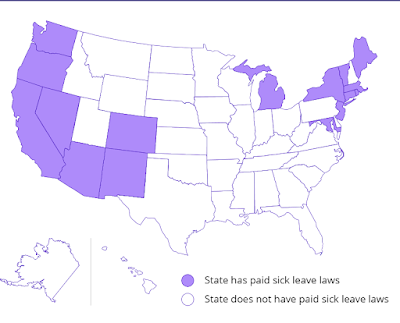Paid Sick Leave Laws by State
How Paid Sick Leave Laws Vary by State
States with Paid Sick Leave Laws
Currently, 14 states and Washington, D.C. have paid sick leave laws in place. These states include:
- Arizona
- California
- Colorado
- Connecticut
- Massachusetts
- Maryland
- Maine
- Michigan
- Nevada
- New Jersey
- Oregon
- Rhode Island
- Vermont
- Washington
States with Pending Paid Sick Leave Laws
Several states have pending paid sick leave laws that are expected to take effect in 2022. These states include:
- Hawaii
- Minnesota
- New Mexico
- New York
- Pennsylvania
States with No Paid Sick Leave Laws
The following states do not have any paid sick leave laws in place:
- Alabama
- Arkansas
- Florida
- Georgia
- Idaho
- Indiana
- Iowa
- Kansas
- Kentucky
- Louisiana
- Mississippi
- Missouri
- Montana
- Nebraska
- New Hampshire
- North Carolina
- North Dakota
- Ohio
- Oklahoma
- South Carolina
- South Dakota
- Tennessee
- Texas
- Utah
- Virginia
- West Virginia
- Wisconsin
- Wyoming
How Paid Sick Leave Laws Work
The specifics of paid sick leave laws can vary by state, but there are some common elements. Generally, employees are entitled to a certain amount of paid sick leave based on the number of hours worked. This can be accrued over time or provided upfront at the beginning of a year. Employers may require documentation such as a doctor's note if an employee takes more than a certain number of consecutive sick days. Employers may also be required to provide notice to employees about their rights to paid sick leave.
Benefits of Paid Sick Leave
There are several benefits to paid sick leave laws. For employees, paid sick leave allows them to take time off work when they are sick or need to care for a family member without losing pay. This can help employees avoid financial hardship and reduce the spread of illness in the workplace. For employers, paid sick leave can help reduce turnover and increase productivity by keeping employees healthy and engaged.
Drawbacks of Paid Sick Leave
While there are many benefits to paid sick leave, there are also some drawbacks. For employers, paid sick leave can increase costs and administrative burdens. Some employers may also worry about employees abusing paid sick leave by taking time off when they are not actually sick. For employees, paid sick leave may not be sufficient to cover the full amount of time they need off work, which can lead to financial hardship.
FAQ
Q: How much paid sick leave am I entitled to?
A: The amount of paid sick leave you are entitled to depends on your state's laws and can vary based on factors such as the size of your employer and the length of your tenure.
Q: Can my employer require me to provide documentation for sick leave?
A: Yes, some employers may require documentation such as a doctor's note if you take more than a certain number of consecutive sick days.
Q: What happens if I use all of my paid sick leave?
A: If you use all of your paid sick leave, you may be required to take unpaid time off if you need more time off work due to illness or injury.
Q: Can my employer deny me paid sick leave?
A: In states with paid sick leave laws, employers are generally required to provide paid sick leave to eligible employees. However, there may be exceptions or exemptions for certain types of employees.
Conclusion
Paid sick leave laws can vary significantly by state, and it is important for employees to understand their rights and benefits. While there are many benefits to paid sick leave, there are also some drawbacks, and it is important for employers to weigh the costs and benefits of providing paid sick leave. As an employee, it is important to know your rights and to advocate for yourself if you feel your employer is not providing the paid sick leave you are entitled to.

